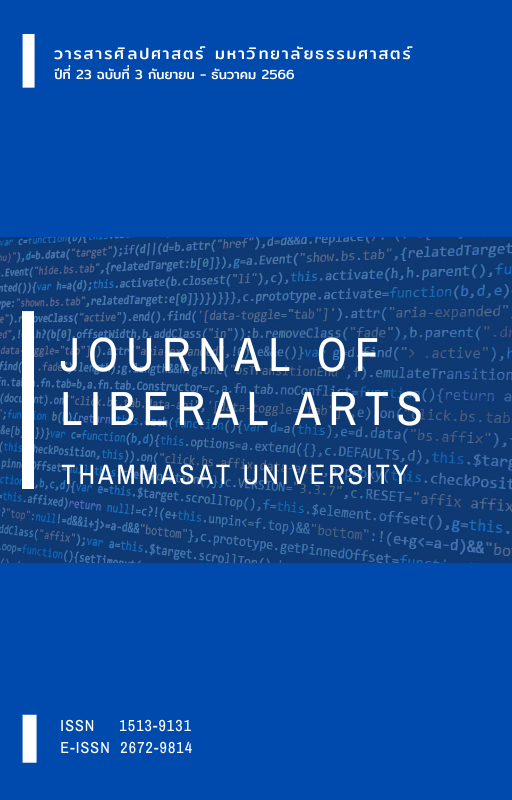วุฒิภาวะทางอาชีพของผู้เรียนระดับปริญญาตรี สาขาอุตสาหกรรมการท่องเที่ยวและการบริการ
Main Article Content
บทคัดย่อ
บทความวิจัยนี้ มีเป้าประสงค์เพื่อ 1) ศึกษาระดับวุฒิภาวะทางอาชีพของผู้เรียนระดับปริญญาตรี สาขาอุตสาหกรรมการท่องเที่ยวและการบริการ และ 2) เปรียบเทียบภูมิหลังกับวุฒิภาวะทางอาชีพของผู้เรียน เก็บข้อมูลด้วยแบบสอบถามจากผู้เรียนระดับปริญญาตรี ด้านอุตสาหกรรมการบริการและการท่องเที่ยว จำนวน 257 คน เลือกตัวอย่างแบบหลายขั้นตอน วิเคราะห์ข้อมูลด้วยสถิติพรรณนาและสถิติอ้างอิง ผลการวิจัย แสดงผลว่า 1) ผู้เรียนระดับปริญญาตรี สาขาอุตสาหกรรมการท่องเที่ยวและการบริการมีวุฒิภาวะทางอาชีพระดับค่อนข้างสูง และ 2) ผู้เรียนมีภูมิลำเนาต่างกันมีวุฒิภาวะทางอาชีพแตกต่างกัน (p < 0.05)
Downloads
Article Details

อนุญาตภายใต้เงื่อนไข Creative Commons Attribution-NonCommercial-NoDerivatives 4.0 International License.
เอกสารอ้างอิง
จินดารัตน์ โพธิ์นอก. (2559). วุฒิภาวะด้านอาชีพ. https://www.dailynews.co.th/article/376086
ทัตพิชา สุขรัตน์ และ ธีรพัฒน์ วงศ์คุ้มสิน. (2562). ต้นทุนชีวิต การพัฒนาตนเอง ทักษะทางสังคม และวุฒิภาวะทางอาชีพของนักเรียนอาชีวศึกษา วิทยาลัยเทคนิคศรีสะเกษ. วารสาร มจร. สังคมศาสตร์ปริทรรศน์, 8(1), 165-177.
นเรศ กันธะวงค์, อรจิรา ธรรมไชยางกูร, และ ประยุทธ เทียมสุข. (2556). ศึกษาผลของโปรแกรมการเตรียมตัวสู่โลกแห่งอาชีพเพื่อเพิ่มความพร้อมในการสมัครงานของนักศึกษาชั้นปีที่ 3 คณะศิลปศาสตร์ มหาวิทยาลัยเทคโนโลยีราชมงคลพระนคร. มหาวิทยาลัยเทคโนโลยีราชมงคลพระนคร.
นฤมล ตั้งประพฤติดี. (2553). ผลของโปรแกรมการเรียนรู้ด้วยตนเองที่มีต่อวุฒิภาวะทางอาชีพด้านเจตคติ [วิทยานิพนธ์ปริญญามหาบัณฑิต]. มหาวิทยาลัยศรีนครินทรวิโรฒ.
สภาพัฒน์ ชี้ว่างงานพุ่ง 7.6 แสนคน นักศึกษาจบใหม่ 4.9 แสนคนสะเทือน. (24 พฤษภาคม 2564). ประชาชาติธุรกิจ. https://www.prachachat.net/finance/news-675530
สศช.ชี้โควิด-19 ทำว่างงานพุ่ง กดดันสัดส่วนหนี้ครัวเรือนเพิ่ม. (26 พฤษภาคม 2564). กรุงเทพธุรกิจ. https://www.bangkokbiznews.com/news/detail/940106
Abidin, M. H. Z., Amanta, S., Subhan, M., Mahmud, M. I., Ali, S., & Baker, A. Y. A. (2018). Career maturity among gifted and talented students in Malaysia. International Journal of Engineering and Technology, 7(2.10), 74-75.
Bae, S. M. (2017). An analysis of career maturity among Korean youths using latent growth modeling. School Psychology International, 38(4), 434-449.
Barendse, T. (2015). The levels of career maturity among final year undergraduate students, within a department, at a higher education institution, in the Western Cape [Unpublished master thesis]. University of the Western Cape.
Buchner, A. (2010). G*Power: Users guide-analysis by design. Heinrich-Heine-Universität.
Carkit, E., & Bacanli, F. (2020). Gender differences on career maturity: A meta-analysis study. Pamukkale Universitesi Egitim Fakultesi Dergisi-Pamukkale University Journal of Education, 48, 84-104.
Chakrapani, C. (2011). Statistical reasoning vs. magical thinking: Shamanism as statistical knowledge: Is a sample size of 30 all you need?. http://www.chuckchakrapani.com/articles/pdf/0411chakrapani.pdf
Chen, J. S., Chu, K. H. L., & Wu, W. C. (2000). Tourism students’ perceptions of work values: A case of Taiwanese universities. International Journal of Contemporary Hospitality Management, 12(6), 360-365.
Chuang, N. K., & Jenkins, M. D. (2010). Career decision making and intention: A study of hospitality undergraduate students. Journal of Hospitality and Tourism Research, 34(4), 512-530.
Cohen, J. (1988). Statistical power analysis for the behavioral sciences (2nd ed.). Lawrence Erlbaum Associates.
Crites, J. O. (1973). Theory and research handbook for the career maturity inventory. CTB/McGraw-Hill.
Crites, J. O., & Savickas, M. L. (1996). Revision of the career maturity inventory. Journal of Career Assessment, 2(4), 131-138.
Cronbach, L. J. (1990). Essential of psychological testing. Harper & Row.
Esters, L. T., & Retallick, M. S. (2013). Effect of an experiential and work-based learning program on vocational identity, career decision, self-efficacy and career maturity. Career and Technical Education Research, 38(1), 69-83.
Ghofur, M. A., Soejoto, A., & Pamungkas, H. P. (2020). Analysis of socioeconomic status, gender and academic achievements influence on student career maturity. Facta Universitatis, 17(3), 219-230.
Harlow, A. J., & Bowman, S. L. (2016). Examining the career decision self-efficacy and career maturity of community college and first-generation students. Journal of Career Development, 43(6), 512-525.
Herrak, P., Bo, Y. C., Suk, K. N., & Sang, M. L. (2011). The role of career stress in the relationship between maladaptive perfectionism and career attitude maturity in South Korean undergraduates. Journal of Employment Counseling, 48(1), 27-36.
Heo, G., & Kim, T. (2016). Autoregressive cross-lagged modeling of reciprocal longitudinal relationship between self-esteem and career maturity. Journal of Career Development, 43(3), 273-288.
Kim, J. H., & Shin, H. S. (2020). Effects of self-reflection-focused career course on career search efficacy, career maturity, and career adaptability in nursing students: A mixed methods study. Journal of Professional Nursing, 36(5), 395-403.
Lee, P. C., Lee, M. J., & Dopson, L. R. (2018). Who influences college students’ career choice? An empirical study of hospitality management students. Journal of Hospitality and Tourism Education, 3, 1-13.
Lee, S., & Nam, J. (2018). The influence of career maturity of university students majoring in library and information science on professional pursuit: Moderating effect of satisfaction with professor-student relationship. Journal of the Society for Information Management, 35(2), 167-186.
Liu, Y., Peng, K. Z., Mao, Y., & Wong, C. S. (2017). Different forms of relationships between vocational interests and career maturity in Chinese context. Journal of Career Development, 44(5), 425-429.
Mukaihata, T. (2001). Correlation between career security as motivation and career maturity among nursing students. The Japanese Association of Rural Medicine, 13(2), 168-171.
Rovinelli, R. J., & Hambleton, R. K. (1977). On the use of content specialists in the assessment of criterion-referenced test item validity. Tijdschrift voor Onderwijresearch, 2(2), 49-60.
Seo, J., & Kim, M. (2019). A prediction model of factors related to career maturity in Korean high school students. Child Health Nursing Research, 25(2), 95-212.
Tarver, A. T. (2017). Career maturity and college students: A case study comparison of student-athletes and on-athletes at a division I institution [Unpublished doctoral dissertation]. Northeastern University.
Tekke, M., & Ghani, M. F. A. (2013). Examining the level of career maturity among foreign students in a public university: Gender and academic achievement. HOPE Journal of Research, 1(1), 100-121.
Xiao, X. (2012). Career behaviors of tourism management students in China [Unpublished master thesis]. Kent State University.
Zahari, M. (2004). A Study of factors moderating Malaysian hospitality students selection of tertiary education institutions, programme and subsequent career intentions [Unpublished doctoral dissertation]. Lincoln University.


